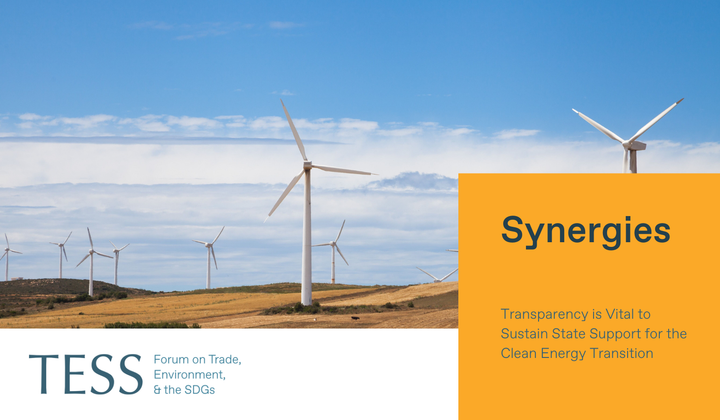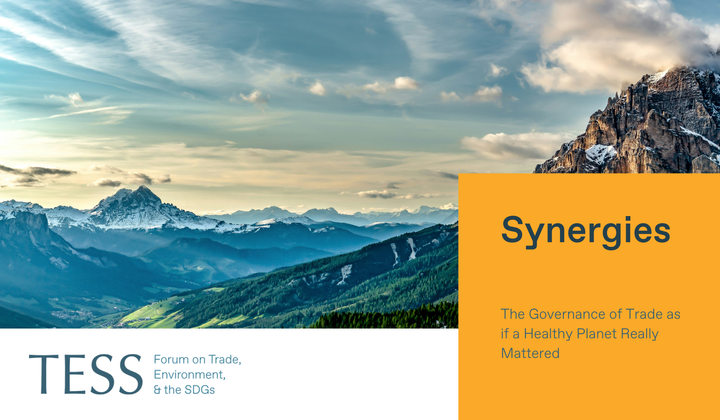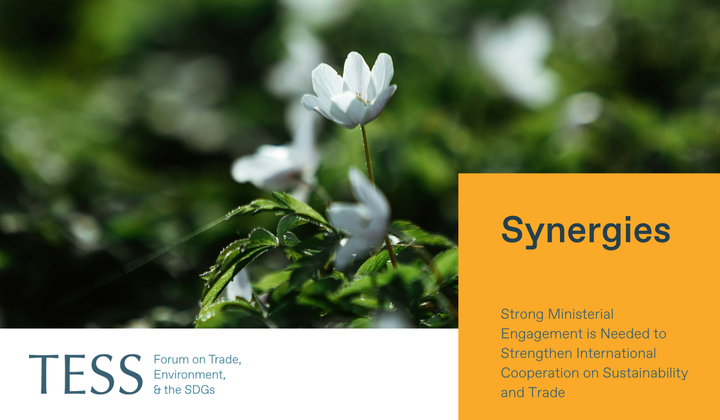New corporate accountability tools that aim to hold companies accountable for the sustainability of their operations along their entire supply chain are moving into a space that is not or hardly occupied by the WTO. Trade negotiators are advised to become acquainted with the dynamics of the environmental and financial communities—and the growing range of supply chain initiatives—sooner rather than later.
This article is part of a Synergies series on reviving multilateralism curated by TESS titled From Vision to Action on Trade and Sustainability at the WTO. Any views and opinions expressed are those of the author(s) and do not necessarily reflect those of TESS or any of its partner organizations or funders.
-----
A new phenomenon is currently developing in international trade: the increased use of corporate accountability tools that aim to hold companies accountable for the sustainability of their operations along their entire supply chain. This development is already the talk of many UN climate change conferences and one that should be high on the agenda for attention on the road to the Fourteenth WTO Ministerial Conference (MC14). Indeed, this new development is creating headaches for supply chain managers and, just as importantly, could place additional stress on the relevance of the WTO dispute settlement mechanism.
One example concerns accountability for greenhouse gas (GHG) emissions along supply chains. The Greenhouse Gas Protocol (GHG Protocol) invites multinationals to report on their so-called Scope 3 emissions—i.e. the emissions that take place upstream or downstream in their supply chains. This has triggered a significant level of engagement by multinationals who saw a business interest in being an early mover in this direction while Scope 3 reporting was still voluntary. But the new EU Corporate Sustainability Reporting Directive requires large firms to start reporting their Scope 3 emissions as of 2025. Providing information on “embedded” emissions (i.e. emissions upstream in the supply chain) of imported goods is also an obligation for supply chains covered by the EU’s Carbon Border Adjustment Mechanism (CBAM) regulation and other carbon border adjustment initiatives currently under consideration in other countries. Financial regulators in G7 countries like the United States and Japan are also considering requesting information on Scope 3 emissions from listed companies.
Challenges in Dealing With Corporate Accountability Tools
Most of these initiatives, legislations, and regulations originate with environmental or financial regulators. Strictly speaking, they would therefore not be considered trade policies. Yet they are highly relevant for international trade and the multilateral trading system. This is the case because a company based in country A will have to provide information on GHG emissions occurring during production in country B if the company in country A uses inputs from country B. Information on a traded good has to be provided in country A, either to border authorities or to another domestic authority. If this cannot be done or if it cannot be done in an appropriate way, then trade will be affected.
It is not new for border authorities to be interested in how a good has been produced in another country. It is, for example, common for border authorities to check whether imported foodstuffs meet food safety standards. What is new is that border authorities will need to check something that cannot be detected in the good that is being traded. In testing a piece of clothing, for example, it will not be possible to assess the amount of GHG emitted in making that product.
In WTO language, this implies that corporate accountability tools require that importers and producers provide information on “non-product-related processes and production methods (NPR-PPMs)”—i.e. something that happens abroad but is not visible in the product itself and can hence not be controlled by border authorities. Because PPMs cannot be detected at the border, they have been considered to entail the risk of hidden protectionism. Not surprisingly, the multilateral trading system has traditionally found it difficult to deal with NPR-PPMs. Corporate accountability tools like the ones described above are therefore moving into a space that is not or hardly occupied by the WTO.
The multilateral trading system has traditionally found it difficult to deal with non-product-related processes and production methods.
Such tools create considerable challenges for supply chain managers in private companies for the same reason that the WTO has found it hard to deal with them: they require the collection of information on activities that take place on different territories. For these managers it is difficult to monitor this information and to aggregate it in a way that makes sense along the supply chain. Imagine a relatively simple supply chain with a multinational having ten suppliers in three different countries and buyers in four countries. Tracking GHG emissions or any other environmental or social indicator at each stage would be complex and require that information flows seamlessly across multiple borders. There are also concerns that the costs of compliance with corporate accountability tools (e.g. implementation, demonstrating compliance, acquiring information about what is required) will become prohibitive for certain suppliers in global supply chains, in particular for small businesses and especially for those in developing countries.
Additional Stress on the Relevance of the WTO Dispute Settlement System
Corporate accountability tools carry the risk of putting additional stress on the relevance of the WTO dispute settlement system by moving certain trade-related disputes out of this system and into national courts.
In the context of international trade law, it will be challenging to deal with NPR-PPMs and hence with corporate accountability tools, as this implies dealing with processes that are governed by different jurisdictions given that firm-level operations typically have to abide by the laws of the territory where their operations take place. Corporate accountability tools―where they are mandatory―circumvent this jurisdiction challenge by allowing complaints to be raised in civil courts in the country implementing the tool and by making companies hosted in that country accountable for what their suppliers abroad do. And this brings me to the last point made in the opening paragraph, which is that these accountability tools carry the risk of putting additional stress on the relevance of the WTO dispute settlement system by moving certain trade-related disputes out of this system and into national courts.
Trade negotiators are advised to become acquainted with the dynamics of the environmental and financial communities—and the growing range of supply chain initiatives—sooner rather than later, as well as try to gain a better understanding of the challenges that supply chain managers currently face. The reference in the MC13 Ministerial Declaration to the importance of “open, inclusive, resilient, sustainable, diversified and reliable global supply chains” provides an opening for relevant discussions to take place at the WTO.
-----
Marion Jansen is the Director of the Trade and Agriculture Directorate at the OECD.
-----
Synergies by TESS is a blog dedicated to promoting inclusive policy dialogue at the intersection of trade, environment, and sustainable development, drawing on perspectives from a range of experts from around the globe. The editor is Fabrice Lehmann.
Disclaimer
Any views and opinions expressed on Synergies are those of the author(s) and do not necessarily reflect those of TESS or any of its partner organizations or funders.
License
All of the content on Synergies is licensed under a Creative Commons Attribution-NonCommercial-ShareAlike 4.0 International (CC BY-NC-SA 4.0)
license. This means you are welcome to adapt, copy, and share it on your platforms with attribution to the source and author(s), but not for commercial purposes. You must also share it under the same CC BY-NC-SA 4.0 license.
If you would like to reuse any material published here or if you have any other question related to Synergies, send an email to fabrice.lehmann@graduateinstitute.ch.




